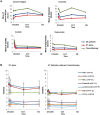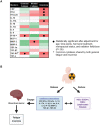Inflammatory Biomarkers, Hematopoietic Stem Cells, and Symptoms in Breast Cancer Patients Undergoing Adjuvant Radiation Therapy
- PMID: 33134822
- PMCID: PMC7583146
- DOI: 10.1093/jncics/pkaa037
Inflammatory Biomarkers, Hematopoietic Stem Cells, and Symptoms in Breast Cancer Patients Undergoing Adjuvant Radiation Therapy
Abstract
Background: Fatigue and insomnia are common symptoms experienced by breast cancer patients undergoing adjuvant radiation therapy (RT), yet the underlying mechanisms of these symptoms are unclear. In particular, the roles of hematopoietic stem cells (HSCs) and inflammatory cytokines remain to be elucidated.
Methods: Breast cancer patients (n = 147) completed questionnaires to longitudinally assess symptoms before, during, and after adjuvant RT. Phlebotomies were performed prior to RT, at the second and fifth treatment fractions, end of treatment (EOT), and 1 month after completing RT, assessing for CD34+, CD45+, full hematology, and 17 inflammatory cytokines. The associations between symptoms and all biomarkers were evaluated. All statistical tests were 2-sided.
Results: General fatigue and insomnia worsened with RT, with peak levels observed at EOT, which remained statistically significant even after controlling for anxiety and depression (P < .05 for all). CD34+, CD45+, white blood cell, and lymphocyte counts decreased, with the lowest levels also observed at EOT (P < .001). Fatigue and insomnia were associated with changes in both interferon γ-induced protein 10 (IP-10) - (P = .03 and P = .01, respectively) and tumor necrosis factor receptor II (TNF-RII) (P = .02 and P = .006, respectively), while mental fatigue was associated with increased matrix metalloproteinases-2 (MMP-2) levels (P = .03). Patients who received prior chemotherapy demonstrated statistically significantly greater severity in all symptoms, with lower baseline HSC levels.
Conclusions: This is the first longitudinal study to examine linkages between symptoms, HSCs, and cytokines, demonstrating that fatigue and insomnia shared associations with increasing serum levels of IP-10 and TNF-RII, and mental fatigue was associated with increasing serum levels of MMP-2. Our findings highlight opportunities for further research into mechanisms and potential interventions for these symptoms.
© The Author(s) 2020. Published by Oxford University Press.
Figures



References
LinkOut - more resources
Full Text Sources
Research Materials
Miscellaneous
